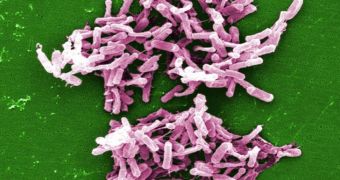According to a paper published in the online edition of the journal Clinical Infectious Diseases this April 24, there is evidence to suggest that frozen poop transplants can successfully treat C. difficile infections.
In their paper, the scientists who worked on this research project explain that C. difficile, whose full name is Clostridium difficile, is a bacterium that causes the people it comes to infect to suffer from recurrent diarrhea.
This bacterium is said to put some 250,000 people in the United States alone in the hospital on a yearly basis. What's more, specialists say that C. difficile infections are to blame for about 140,000 deaths documented in this country annually.
Although antibiotics have been known to have some success in treating such infections, the fact remains that, in about 30% of case, the symptoms associated with C. difficile infections recur. What's more, the long-term use of antibiotics can kill normal intestinal microbes.
Previous studies have shown that, in the case of both human and animal subjects, poop transplants, otherwise known as fecal microbiota transplants, have a success rate of about 90% in treating recurring infections with said bacterium.
“Without this treatment option, patients with recurrent C. difficile may have chronic diarrhea and need to live on chronic antibiotic treatment, which is both expensive and can have other side effects,” explains report senior author Elizabeth Hohmann.
According to EurekAlert, it is believed that such transplants treat C. difficile infections by helping intestinal microbes reestablish their normal balance. The trouble is that, since finding suitable donors is time-consuming and rather costly, this procedure is not widely available.
Looking to solve this problem, specialists with the Massachusetts General Hospital carried out a series of experiments intended to test whether or not frozen poop could be used when carrying out such transplants.
The researcher started by collecting stool samples from several healthy donors, whom they had previously asked not to eat allergens such as nuts and eggs prior to donation. They then filtered, diluted, screened, and froze the poop.
After being kept in a fridge for about 4 weeks, the matter was thawed and administered to a total of 20 patients who had either been hospitalized because of C. difficile infections or whom doctors had failed to treat by means of antibiotics. 10 of these patients received their transplants through colonoscopy, whereas the others were treated by means of a gastric nanotube.
After just one administration, 14 of the people taking part in this research project were cured. One participant dropped out of the study, and, after a second administration, 4 of the remaining 5 were also cured, the Massachusetts General Hospital specialists say.
“It's been very gratifying to be able to help these patients, some of whom have been sick for a year or two. They have told us this has been life changing for them and that they have gotten themselves back to normal,” specialist Elizabeth Hohmann commented on the outcome of these experiments.
Furthermore, “There aren't many things in medicine that have a success rate of more than 90 percent. Insurers may not want to pay for this, but it is very effective, makes patients better quite quickly and saves money overall. While it may never become a first-line treatment, we are starting to consider using it more and more often.”
The researchers hope that, thanks to their work, this method of treating C. difficile infections will one day become more widely available.

 14 DAY TRIAL //
14 DAY TRIAL //